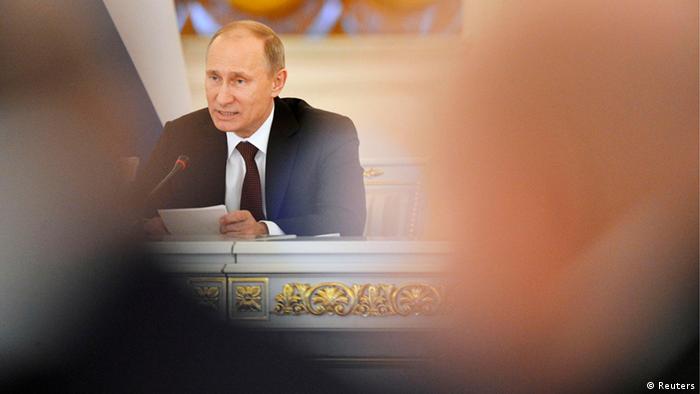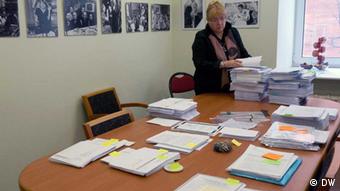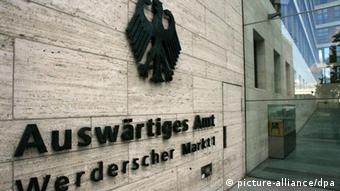Russian officials have launched a campaign to determine which NGOs active in Russia - including German groups - should be classed as 'foreign agents.' Disputes over Russia's move have soured German-Russian relations.
Vladimir Putin means business. "Every direct or indirect intervention in our internal affairs is unacceptable," the Russian president said during a meeting with domestic security officials in mid-February. It was a clear message to the non-governmental organizations (NGOs) in Russia - to both Russian and foreign NGOs active in the country.
Those who are involved politically with foreign countries and receive money from abroad have been required since November 2012 to register themselves as "foreign agents."
But many have chosen to ignore the new law. A number of NGO representatives, including prominent human rights groups like the Moscow Helsinki Group or the Memorial group, do not want to brand themselves as "agents."
A poll conducted in fall 2012 by the Levada Center, a Moscow-based polling firm, indicated that two-thirds of Russians have negative associations with the term "foreign agent."
Searching for agents
A Russian campaign against NGOs already began in March. Hundreds have reported visits from representatives of the state prosecutor's office, tax authorities, the department of state and the secret service. The visits often follow a pattern, as they have done at the Memorial human rights center in Moscow. A tax official appeared on Tuesday (26.03.2013) just before 10 a.m. A few hours later, an employee with the state prosecutor's office came by to view documents housed at the center, a DW correspondent has reported.
Those who are involved politically with foreign countries and receive money from abroad have been required since November 2012 to register themselves as "foreign agents."
But many have chosen to ignore the new law. A number of NGO representatives, including prominent human rights groups like the Moscow Helsinki Group or the Memorial group, do not want to brand themselves as "agents."
A poll conducted in fall 2012 by the Levada Center, a Moscow-based polling firm, indicated that two-thirds of Russians have negative associations with the term "foreign agent."
Searching for agents
A Russian campaign against NGOs already began in March. Hundreds have reported visits from representatives of the state prosecutor's office, tax authorities, the department of state and the secret service. The visits often follow a pattern, as they have done at the Memorial human rights center in Moscow. A tax official appeared on Tuesday (26.03.2013) just before 10 a.m. A few hours later, an employee with the state prosecutor's office came by to view documents housed at the center, a DW correspondent has reported.
But an increasing number of NGOs are protesting against the checks being carried out by state officials. The steering committee of the EU-Russia Civil Society Forum has spoken of a campaign against civil society organizations and demanded the government justify its recent actions toward NGOs.
Russia's Ministry of Justice responded simply that the checks are to determine which organizations fulfill the definition of "foreign agents" in accordance with the new law.
Criticism from Berlin
It was the search for foreign agents that initially led Russian prosecutors to the offices of German political foundations, said Peter Schulze, the former head of the Moscow office of the Friedrich Ebert Foundation (FES), which has ties to Germany's center-left Social Democratic Party.
It's not directed so much against Germany's political foundations themselves, Schulze continued, explaining that Russian investigators are much more interested in the contact between German foundations and Russian NGOs and "whether they are receiving financial support."
There have been media reports that Russian authorities examined documents for hours in Moscow at the Friedrich Ebert Foundation.
A second German foundation has reported similar experiences - the Konrad Adenauer Foundation (KAS), which has ties to the center-right Christian Democrats. The KAS office in Saint Petersburg was visited Tuesday for the second time by state prosecutors. The first time, the foundation just had to hand over a catalogue of questions to the investigators. This time, however, a computer was confiscated. Hans-Gert Pöttering, who chairs KAS, sharply criticized Russia's move, calling it "alarming and in no way acceptable."
The Federal Foreign Office reported that German Foreign Minister Guido Westerwelle invited Russian diplomat Oleg Krasnitzky to his office to express Germany's concerns with respect to actions toward a number of NGOs. Now the mood has soured between Berlin and Moscow just two weeks ahead of a planned visit by Putin to Germany. The Russian president intends to come to the April 7 opening of the Hannover Messe, a trade fair at which he is also slated to meet Chancellor Angela Merkel.
"I'm assuming that during Putin's visit, these matters will also be discussed," said the chair of the foreign committee in Germany's parliament, Ruprecht Polenz, in an interview with DW.
Russia's Ministry of Justice responded simply that the checks are to determine which organizations fulfill the definition of "foreign agents" in accordance with the new law.
Criticism from Berlin
It was the search for foreign agents that initially led Russian prosecutors to the offices of German political foundations, said Peter Schulze, the former head of the Moscow office of the Friedrich Ebert Foundation (FES), which has ties to Germany's center-left Social Democratic Party.
It's not directed so much against Germany's political foundations themselves, Schulze continued, explaining that Russian investigators are much more interested in the contact between German foundations and Russian NGOs and "whether they are receiving financial support."
There have been media reports that Russian authorities examined documents for hours in Moscow at the Friedrich Ebert Foundation.
A second German foundation has reported similar experiences - the Konrad Adenauer Foundation (KAS), which has ties to the center-right Christian Democrats. The KAS office in Saint Petersburg was visited Tuesday for the second time by state prosecutors. The first time, the foundation just had to hand over a catalogue of questions to the investigators. This time, however, a computer was confiscated. Hans-Gert Pöttering, who chairs KAS, sharply criticized Russia's move, calling it "alarming and in no way acceptable."
The Federal Foreign Office reported that German Foreign Minister Guido Westerwelle invited Russian diplomat Oleg Krasnitzky to his office to express Germany's concerns with respect to actions toward a number of NGOs. Now the mood has soured between Berlin and Moscow just two weeks ahead of a planned visit by Putin to Germany. The Russian president intends to come to the April 7 opening of the Hannover Messe, a trade fair at which he is also slated to meet Chancellor Angela Merkel.
"I'm assuming that during Putin's visit, these matters will also be discussed," said the chair of the foreign committee in Germany's parliament, Ruprecht Polenz, in an interview with DW.
Atmosphere of uncertainty
It's not yet clear what consequences the current investigations will have for NGOs in Russia. The law states that those who refuse to register with authorities as foreign agents must pay fines of up to the equivalent of 10,000 euros ($12,857) or face the revocation of their licenses. Former Friedrich Ebert Foundation head Peter Schulze advises Russian NGOs to register regardless, and if they end up being hindered in their work, to protest.
Schulze sees political reasons for the sharpened NGO law in Russia, saying, "[The authorities] likely want to arm themselves preemptively."
The Russian government has been "extremely unsettled" following the protests against the results of the parliamentary and presidential elections in 2012, he said.
The Russian government believes the protests were steered from abroad, but the NGOs have already disputed such claims. dw de




No comments:
Post a Comment